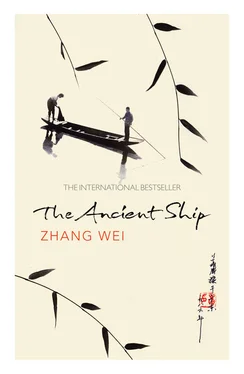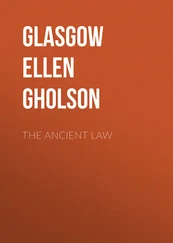He received no answer. None of the men around the haystack had an answer to that question. Sui Buzhao, whose trancelike state allowed for some sorrow, picked this moment to leave the broken old ship and lie down exhausted on the hay. Silence lay over the men and the haystack. The stars were enormous, some shining like bright lanterns. The sharp, mournful sounds of the flute still sliced through the night. Chilled winds cut to the bone. Baopu rolled a cigarette and lit it, then curled up as far as his back would let him.
After fiddling with his liquor bottle, Sui Buzhao stood up unsteadily and, his steps wobbly, paced back and forth in front of the haystack, his tiny eyes poking through the darkness. There were no more conversations; everyone stared at him. He flung his bottle through the air; it hit a wall and broke. “Good shot!” he cried out. Then he laughed. “Two masts with one goddamn shot…don’t act so surprised! An armada of warships came from the south to wage war on Wali. There were corvettes, frigates, corsairs, towered ships, and bridged ships. They didn’t know we had a giant ship of our own in port, a seven-thousand-tonner with four or five hundred men and six cannons. I stood on the dock with my telescope trained on their sailors, black men who weren’t wearing pants. That infuriated me! ‘Set sail at once and engage the turtle scum!’ I shouted. Our ship pulled noisily away from the pier and moved out with a following wind. Li Xuantong wanted to come aboard and fight with the rest of us, but I told him to stay ashore and keep reading his sutras. It was a battle for the ages, recorded in the history of our town. You can check it for yourself…it happened in 485 bce…and people were still talking about it hundreds of years later. Wali’s brilliant reputation was well deserved, and talented people came from miles around. Fan Li, the old man, was not valued in foreign countries, so he floated over from the Eastern Ocean in a basket. The banks of the Luqing River were so cold that year that the frost settled on the corn before it could be harvested, and it would have been lost if not for Zou Yan from the west bank, who blew his flute and melted the frost. Gimpy’s playing cannot compare. He just spends his time on the floodplain, but I wouldn’t be surprised if he was a reincarnation of Zou Yan. A few years after the melting of the frost, the First Emperor of Qin rose to power, and Xu Fu, from the Xu family in East Wali, was possessed. He insisted on taking me to meet the First Emperor. Not me. I preferred to practice meditation with Li Xuantong…” At this point in Sui Buzhao’s narration, his legs got tangled up and he stumbled to the ground. That broke the trance that held the others, who rushed over to help him up.
Li Zhichang stayed where he was, however. He had been listening to Sui Buzhao with the others, but not a single word got through to him. He was still thinking about Star Wars. Since he did not grasp all the details and had many questions about related issues, such as the effects on politics and the economy, when Crackpot came back and sat down, he asked him to tell him more.
“I could talk all day and still not be finished,” Crackpot said with a shake of his head. “We’ll get back to it some other day. It’s an important, serious issue, and I wish there was someone in town who’d debate it with me, the way my uncle used to—”
“Not me!” Li Zhichang said. “I can’t.”
The sky was beginning to lighten up in the east, creating an air of tranquillity. Baopu was thinking about the dim candle that burned in Dahu’s house and how the wick was flickering. Zhang-Wang, a hard look on her face, was seated on a rush mat, and everyone was waiting for dawn to break. Gimpy’s flute was not as crisp as it was at night; now it had a delicate, gentle quality. And the winds were no longer so cold, warmed, it seemed, by the strains of the flute. Baopu was reminded of his uncle’s strange comment, that Gimpy might be a reincarnation of Zou Yan.
Leilei was no taller than a few years before, it seemed to Baopu, and hadn’t changed a bit. By counting on his fingers he tried to fix the boy’s age but couldn’t do it. The boy’s head was nice and round, shaved on all four sides, with just a tuft of hair on the top. He had a gray pallor on his skin, which never seemed quite dry. The outer corners of his eyes turned strangely upward, just like his father’s, Li Zhaolu’s, and he had thin, curved, almost feminine brows, much like those of his mother, Xiaokui. Baopu wished he could somehow hold the boy in his arms. He often dreamed that he had his arms around him and was kissing him. “You should call me Papa,” he said to the boy in his dreams.
Once, when he was walking by the river, he spotted Leilei coming toward him carrying a live fish, its head hanging low and twisting from side to side. When he spotted Baopu he stopped and looked at him, the corners of his eyes inching upward. It made Baopu feel awkward, almost as if Zhaolu were looking at him. It was an agonizing moment, for he knew that sooner or later that look would compel him to reveal what had happened on that stormy night. So he crouched down and rubbed the tuft of hair as he studied the boy’s face. Everything below those eyes resembled him, Baopu discovered. With a muttered oath, he stood up and hurried off. But then he stopped and turned to take another look. Leilei was still standing there, not moving. Abruptly he held up the fish and shouted: “Pa—” It was a shout Baopu would never forget, and one night, when thoughts of Leilei came to him, he murmured: “Not bad. I’ve got a son!” But then feelings of self-reproach gnawed at him, creating a desire to say that to the boy’s mother. Yet as soon as he was outside and washed in the moon’s rays, he realized he was being ridiculous—Leilei had clearly gotten those eyes from Li Zhaolu. Counting backward, he tried to calculate when Zhaolu had come home for the last time and then recall the date when the old tree by the mill had been struck by lightning. His heart was pounding as he relived the night of passion and joy they had shared. No detail escaped him: Xiaokui’s moans of pleasure, her frail figure, and the two sweaty bodies as lightning flashed outside the window. The night was hideously short, and he recalled Xiaokui’s cry of alarm when the sky began to lighten up in the morning. She was holding him as he lay, utterly exhausted, as if he had only minutes to live. She shook him, maybe thinking he was in mortal danger, and began to cry. He sat up but lacked the strength to jump out her window.
The rain had stopped by the time he was on his way back to his room, and that is where his reminiscences always ended. He concluded that such heart-stopping joy had to have produced fruit, a realization that made him break out in a cold sweat. Time and again he asked himself if there was a chance that he could someday claim the boy who refused to grow up.
The next emotion to torment Baopu was profound remorse. He had watched Xiaokui limp along dragging the boy with her all these years, and he’d never once offered to help, to his everlasting feelings of guilt. There were times when he turned his thoughts upside down, telling himself that Leilei was definitely not his son, and that invariably lifted an emotional burden from his shoulders.
Xiaokui wore her mourning garb for a year. Such attire had likely been outlawed in other places, but not in Wali. Rather than diminish in number, complex funeral rites and strange customs had actually increased in recent years. Where death was concerned, only the eyes of the spirits were watching. For the better part of a year, Xiaokui was seen on the streets and in the lanes clad in funereal white, a reminder to the townspeople not to forget to grieve. When Baopu saw the white garb he immediately thought of Zhaolu, who had died in the far-off northeast provinces. He did not have to be told that if the people in town knew what had happened between him and Xiaokui, he would never be forgiven, for that was what people called “stealing a man’s wife when he’s down.” Zhaolu could not experience the loathing of a man whose wife had been taken from him, for he was already in the ground. This thought made Baopu cringe. But no one in town knew, and no one could imagine that their taciturn neighbor was capable of what had happened on that stormy night. Baopu censured himself anyway.
Читать дальше












